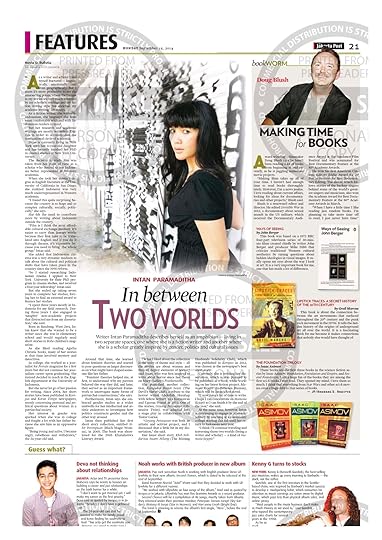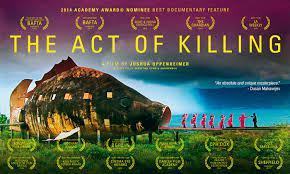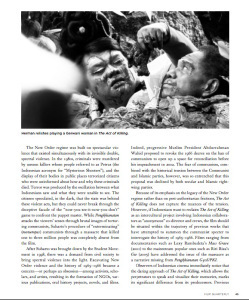Intan Paramaditha's Blog, page 5
December 18, 2014
The Look of Silence and Indonesia’s Dark Mirror
The Conversation, November 20, 2014
By Intan Paramaditha
But I can’t ignore the power of the director holding up the mirror. He offers a particular frame for me to interpret the image – which implicates me in the power relation.

Like its prequel The Act of Killing, Joshua Oppenheimer’s documentary The Look of Silence holds a mirror to its subjects and viewers who are forced to face a horrifying truth (Image: Lars Skree/Final Cut for Real).
With eyes fixed on his television screen, Adi Rukun, the main character followed by documentary maker Joshua Oppenheimer in his new film, The Look Of Silence, seems to face a mirror that resurrects a nightmarish past.
In the footage that he is watching, two old men sit by the bank of the Snake River and proudly narrate the various killing methods they deployed in Indonesia’s 1965-66 anti-communist massacre. Oppenheimer and his crew were behind the camera, filming.
The men, Amir Hasan and Inong, explain in grisly detail how they murdered Ramli, Adi’s brother. Adi and Ramli never met. Attempting to describe Adi’s reaction would only reveal the limits of our capacity to understand the pain of others. This is, perhaps, the look of silence.
December 17, 2014
Wawancara dengan Pamflet Newsletter
Pamflet Newsletter #3, Augstus 2014
“Bicara Tentang Partisipasi Politik Anak Muda, Anak Muda yang Mana?”
Bagaimanakah partisipasi politik anak muda di era awal Reformasi?
Jatuhnya Suharto menciptakan euforia politik dan perayaan kebebasan berekspresi, tapi tak lama kemudian anak muda mulai menyadari bahwa reformasi di tataran elit politik sangat lambat. Tentu ada perubahan yang berarti, yaitu terselenggaranya pemilihan langsung sebagai salah satu penanda penting demokrasi. Tapi bermunculannya kebijakan represif, seperti RUU APP (yang kemudian menjadi UU Pornografi), serta kekerasan atas nama agama di ruang publik menyebabkan banyak anak muda – generasi yang menjadi saksi Reformasi ‘98 — tidak percaya pada negara. Tak heran pada Pemilu 2014 lalu kita mendapati banyaknya first-time voters atau pemilih yang baru tergerak lagi ikut Pemilu setelah 1999. Maka kita perlu ukuran berbeda melihat partisipasi politik anak muda, di luar prosentase suara dalam Pemilu maupun keterlibatan dalam partai politik.
Yang lebih menarik buat saya adalah antusiasme warga dalam mengupayakan perubahan secara independen di ruang publik. Warga membentuk beragam komunitas yang terlepas dari politik praktis, namun bagi saya apa yang mereka upayakan sangat politis. Mereka menawarkan cara pandang baru dalam melihat sejarah, peran agama, seni, maupun gender. Jika kita melihat inisiatif publik sebagai bentuk partisipasi politik, kita bisa melihat kegairahan anak muda menciptakan ruang-ruang baru di awal Reformasi. Banyak inisiatif muncul dengan semangat DIY (do it yourself), dengan dana swadaya maupun bergantung pada lembaga donor. Dan ini tidak bisa disederhanakan sebagai gerak “going where the funding goes.” Ketika anak muda tidak menemukan tempat dalam institusi formal, mereka menciptakan ruang mereka sendiri untuk berkarya, menyebarkan ilmu pengetahuan, membuka kemungkinan dialog.
Selanjutnya lihat di sini
December 14, 2014
Intan Paramaditha: In Between Two Worlds
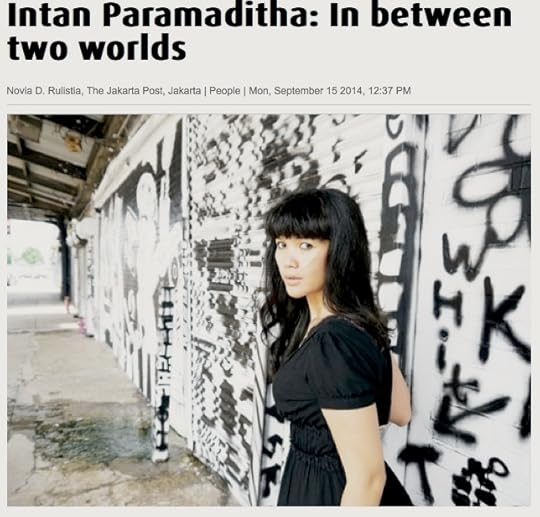
Novia D. Rulistia, The Jakarta Post, Jakarta | People | Mon, September 15 2014, 12:37 PM
Writer Intan Paramaditha describes herself as an amphibian — living in two separate spaces, one where she is a fiction writer and another where she is a scholar greatly inspired by gender, politics and cultural issues.
“As a writer and scholar I feel myself fractured — linguistically, emotionally and even geographically. But I guess it’s more productive to see the intersecting points, where the themes in my stories are very much informed by my scholarly readings and my fiction writing style has enriched my academic writing,” Intan says.
As a fiction writer, she writes in Indonesian, the language she feels most comfortable with and with Indonesian readers in mind.
But her research and academic writings are mostly written in English in order to accommodate the transnational circle of academia.
Intan is currently living in New York with her 11-year-old daughter and has recently finished her PhD in cinema studies at New York University.
The decision to study film was taken from her point of view as a scholar who desired to see Indonesia better represented in Western academia.
When she took her master’s degree in English literature at the University of California in San Diego, she realized Indonesia was very much underrepresented in Western academia.
“I found this quite surprising because the country is so huge and so complex culturally, socially, politically,” she says.
She felt the need to contribute more by writing about Indonesia outside the country.
“Film is I think the most affordable cultural exchange medium. It’s easier to carry than literary works because they first have to be translated into English and if you do it through theater, it’s expensive because you need to bring the whole group,” Intan said.
She added that Indonesian cinema was a very dynamic medium to talk about the cultural and political shifts that have taken place in the country since the 1998 reform.
“So I started researching Indonesian cinema. I applied to New York University for their PhD program in cinema studies, and received a four-year fellowship,” Intan said.
But she ended up taking seven years to complete her studies, forcing her to find an external award to finance her studies.
“I spent three years mostly in Indonesia for my field research. During those years I also engaged in ‘naughty’ non-academic projects that distracted me from my dissertation,” she said.
Born in Bandung, West Java, Intan knew that she wanted to be a writer since she was in elementary school and would regularly send short stories to Bobo children’s magazine.
As she liked reading Agatha Christie books, many of her stories at that time involved mystery and detectives.
In college, she worked as a journalist for Female magazine for a few years but did not continue her journalism career upon graduating. She instead decided to teach in the English department at the University of Indonesia.
But she never let go of her passion for writing. Since 2004, her short stories have been published in Kompas and Koran Tempo newspapers, mostly concerning personal and political questions about women in a patriarchal society.
Her interest in gender was sparked when she was in college and fought a lot with her father because she saw him as an oppressive figure.
“Being young and naïve, I became angry, rebellious and withdrawn,” the 34-year-old said.
Around that time, she learned about feminist theories and started to pose questions on larger discourses on what might have shaped someone like her father.
“Feminist theories helped me, at first, to understand why my parents behaved the way they did, and later, they served as an important framework to interrogate many forms of patriarchal constructions,” she says.
Furthermore, Intan says she embraced gender studies as a wider umbrella for her intellectual and artistic endeavors to investigate how politics constructs gender and the other way around.
Intan then published her first short story collection, entitled Sihir Perempuan (Black Magic Woman), in 2005. The book was shortlisted for the 2005 Khatulistiwa Literary Award.
“What I liked about the collection is the unity of theme and style — all the stories are about women and they all deploy elements of horror,” said Intan, who was first inspired to write about horror since her thesis on Mary Shelley’s Frankenstein.
She published another collection, Kumpulan Budak Setan (The Devil’s Slaves Club), a tribute to the horror writer Abdullah Harahap with fellow writers Eka Kurniawan and Ugoran Prasad in 2010. One of the stories, Goyang Penasaran (Obsessive Twist), was adapted into a stage play in collaboration with Teater Garasi.
“Goyang Penasaran was both an artistic and activist project, and I discussed that a little bit in my dissertation,” she said.
Her latest short story, Klub Solidaritas Suami Hilang (The Missing Husbands Solidarity Club), which was published in Kompas in 2013, was chosen as the newspaper’s best short story.
Currently, she is revising her dissertation, which is also planned to be published as a book, while working on her latest fiction project, Manusia Kejepit (In-between Human), which will be Intan’s first novel.
“I now have a lot of time to write. I hope I can concentrate on Manusia Kejepit so I can finish it by the end of the year,” she said.
At the same time, however, Intan is continuing to engage in academic activity by teaching at a community college starting this fall until her return to Indonesia next year.
“I think I’ll continue traveling and traversing those two worlds (being a writer and scholar) — a kind of manusia kejepit.”
December 12, 2014
Transnational Genders Onscreen, University of Minnesota
Queer and Feminist Cinema in East and Southeast Asia
October 17-18, 2014
35 Nicholson Hall
A conference organized by the IAS Critical Asian Studies Collaborative
Transnational Genders on Screen: Queer and Feminist Cinema in East and Southeast Asia examines the representation of gender and identity in the films of East and Southeast Asia, bringing prominent filmmakers and film scholars from China, Korea, Indonesia, and the US to the University of Minnesota to present and discuss their work. A key focus is the travel, exchange, and alteration of gendered categories, naming practices, and theoretical approaches in film and film studies. Speakers and films will address the complex meanings of terms of Western origin such as gay, transsexual, or feminism as they are reflected on the screens of Indonesia, Korea, Taiwan, Malaysia, and mainland China. The symposium format is designed to allow for the screening of several longer clips or entire films in addition to a 30-40 minute talk, enabling a robust engagement with both relevant films and presenters’ analyses of them. Filmmakers presenting their work will also answer questions and join conversations with the attending scholars and audience members.
The symposium will feature prominent Chinese queer filmmaker Cui Zi’en and speakers Soyoung Kim (Korea National University of Arts), Intan Paramaditha (New York University), Indonesian filmmaker and scholar Koes Yuliadi (ISI Yogyakarta) and Guo-Juin Hong (Duke University).
December 10, 2014
“Si Merah Salju”/ “Snow Red” di Jurnal Perempuan
“Si Merah Salju,” cerpen tentang ingatan, ketercerabutan, dan perempuan penculik, terbit di Jurnal Perempuan 82, Agustus 2014. Versi Bahasa Inggrisnya, “Snow Red,” muncul di Indonesian Feminist Journal vol. 2 Aug 2014.
July 4, 2014
Penghargaan Cerpen Terbaik (Kompas, 26 Juni 2014)
Kompas, 26 Juni 2014, hal. 1.*
JAKARTA, KOMPAS — Cerita pendek atau cerpen karya Intan Paramaditha terpilih sebagai cerpen terbaik yang dimuat harian Kompas selama tahun 2013. Penganugerahan karya tersebut dalam rangka peringatan 49 tahun Kompas, tepat pada 28 Juni 2014.
”Kompas dengan setia memberikan penghargaan karya cerpen terbaik setiap tahun, ini bentuk penghargaan atas pencerahan yang diberikan para penulis,” kata Pemimpin Redaksi Kompas Rikard Bagun dalam sambutan ”Penghargaan dan Peluncuran Antologi Cerpen Pilihan Kompas 2013, Pembukaan Pameran Ilustrasi Cerpen Kompas 2013”, Rabu (25/6), di Bentara Budaya Jakarta.
Penghargaan cerpen terbaik pilihan Kompas diberikan kepada Intan Paramaditha. Karya Intan berjudul ”Klub Solidaritas Suami Hilang” diterbitkan pada edisi Kompas, 31 maret 2013. Intan lahir di Bandung, 15 November 1979. Dia lulusan Universitas Indonesia dan mendapat beasiswa Fulbright untuk belajar sastra di University of California, San Diego, Amerika Serikat. Saat diumumkannya penghargaan itu, Intan sedang berada di Amerika Serikat.
Menurut salah satu anggota dewan juri, Efix Mulyadi, Intan menceritakan persoalan tragis dengan cara dingin dan tak terduga sehingga penuh kejutan. Cerpen Intan dinilai memiliki syarat-syarat lengkap sebagai cerpen yang nyaris sempurna.
”Dia tidak saja mengolah sebuah persoalan hakikat, tetapi memberikan ruang bagi pembaca untuk memahami tokoh-tokoh di dalamnya,” kata Efix.
Cerpen karya Intan itu mengalahkan saingan terdekatnya, berjudul ”Aku, Pembunuh Munir”, karya Seno Gumira Ajidarma. Menurut anggota dewan juri lainnya, Putu Fajar Arcana, Intan bukanlah cerpenis yang produktif. ”Sekali berkarya, menjadi karya yang luar biasa,” kata Arcana.
Intan dianugerahi trofi berupa patung karya Nyoman Nuarta. Sebelumnya, Intan sudah melahirkan antologi cerpennya berjudul, Sihir Perempuan (Black Magic Woman) dan menjadi unggulan Khatulistiwa Literary Award pada 2005.
Pada kesempatan yang sama, Rikard Bagun menyampaikan pula Penghargaan Kesetiaan Berkarya kepada sastrawan Putu Wijaya. Putu tetap menghasilkan tulisan yang tersebar di berbagai media, meskipun dia terpaksa mengetik dengan menggunakan jempolnya, ketika jari lainnya sulit untuk digerakkan.
”Menulis itu bukan karena tangan kita bisa menulis, melainkan karena kemampuan kreativitas imajinasi kita,” kata Putu.
Kegairahan
Ketua panitia kegiatan tersebut, Frans Sartono, mengatakan, cerpenis Indonesia memiliki kegairahan yang tinggi. Setiap hari, Kompas menerima rata-rata 12 karya cerpen sehingga dalam setahun bisa mencapai 4.000 cerpen yang diterima.
”Dari jumlah cerpen yang diterima itu dalam setahun hanya dimuat 52 cerpen, 1 cerpen setiap Minggu,” kata Frans.
Kegairahan itu juga tecermin dalam lokakarya cerpen Kompas sebelumnya. Jumlah peserta yang mengajukan diri ikut lokakarya itu mencapai 380 peserta. Tetapi, daya tampungnya sangat terbatas sehingga hanya terpilih 30 peserta.
Antologi Cerpen Pilihan Kompas 2013 yang diluncurkan berisi 23 cerpen dari 51 cerpen yang dimuat Kompas selama 2013.
Direktur Bentara Budaya Jakarta Hariadi Saptono mengatakan, Pameran Ilustrasi Cerpen Kompas 2013 yang diselenggarakan ibarat harta ”gono-gini” pemuatan cerpen. Ilustrasi cerpen merupakan karya-karya pelukis.
”Ilustrasi dan cerpen itu seperti suami-istri. Tetapi, tidak adilnya adalah harga ilustrasi cerpen sebagai harta visual selalu jauh lebih tinggi dari harga cerpen itu sendiri,” kata Hariadi.
Cerpen karya Intan ”Klub Solidaritas Suami Hilang” itu ditafsirkan dengan ilustrasi berupa lukisan karya Bambang Heras. Bambang Heras merupakan seniman pelukis yang kini menetap di Yogyakarta. Sementara Dewa Budjana, Trie Utami, Bang Saat, Bintang, dan Jalu membawakan adaptasi karya itu dalam bentuk pertunjukan musik. (NAW)
*Teks berita Kompas disalin dari Agus Hamonangan.
Filed under: Fiction - events/ news Tagged: cerpen, literature, news, sastra, short stories







July 3, 2014
Fulbrighter Intan Paramaditha selected as the Best Short Story Writer of 2013
AMINEF News, July 3, 2014
Kompas daily newspaper announced on June 26, 2013 that Intan Paramaditha won the award as the best short story writer for 2013. The award is for her short story entitled “Klub Solidaritas Suami Hilang” (The Solidarity Club of the Missing Husbands) published in Kompas on March 31, 2013.
Buku “Klub Solidaritas Suami Hilang: Cerpen Pilihan Kompas 2013″
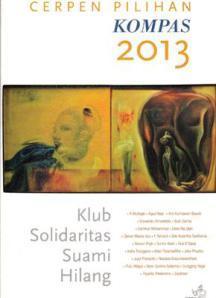
Filed under: Fiction - events/ news Tagged: cerpen, literature, news, sastra, short stories







June 23, 2014
Sunday Film Series: screening & discussion (June 22, 2014)
A special director’s cut screening of The Act of Killing
Speakers: Cobina Gillitt and Intan Paramaditha
June 22, 2014
5:30 pm
Local 61
61 Bergen St., Brooklyn, New York 11201
(image courtesy of Sunday Film Series)
Filed under: Non Fiction - events Tagged: events, film







May 26, 2014
“Obsession for the Visible”: A talk at CEIAS, EHESS, Paris (May 2014)
“Obsession for the Visible: The Politics of Vilified Bodies and Religious Morality in Indonesia”
presented at:
Censorship and Women Resistance in the Performing Arts, from Continental Asia to Insular Southeast Asia
22 et 23 mai 2014
Colloque international organisé par Tiziana Leucci, Dana Rappoport, Davesh Soneji
CEIAS/EHESS – 190 avenue de France 75013 Paris
This two-day conference entitled Censorship and Women’s Resistance in the Performing Arts, from Continental Asia to Insular Southeast Asia brings together scholars and artists from Asia, Europe and North America concerned with censorship and the various forms of struggle and resistance that female performing artists from Central, South and South-East Asia have engaged with in the twentieth and twenty-first centuries.
Filed under: Non Fiction - events Tagged: culture & politics, events, gender & sexuality, talks







March 23, 2014
Tracing Frictions in The Act of Killing
Intan Paramaditha
Film Quarterly, Vol. 67 No. 2 (Winter 2013), pp. 44-49.*
“The Indonesian criminal is, then, not an Other, different from oneself. His face, rather, is an object one sees through, as one sees through spectacles or telescopes.”
James T. Siegel
Joshua Oppenheimer has called The Act of Killing his love letter to Indonesia. It did not take long for him to discover that his love was requited; after hundreds of community screenings in various cities throughout the country, countless comments and reviews have appeared in blogs and social media confirming how Indonesian viewers truly appreciate the labor of love of Oppenheimer and his co-directors Christine Cynn and Anonymous. The Act of Killing is a beautiful and disturbing gift, a mirror that projects the image of the nation so violent and surreal. And this raises further questions: How do Indonesians recognize their faces in the mirror? How do they resituate themselves as witnesses to violence after The Act of Killing?
Click here to read the full text
*Film Quarterly’s special dossier on The Act of Killing via JSTOR.
Filed under: Publication (academic), Publication (essays) Tagged: culture & politics, essays, film







Intan Paramaditha's Blog
- Intan Paramaditha's profile
- 193 followers



